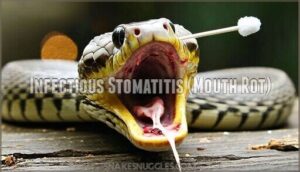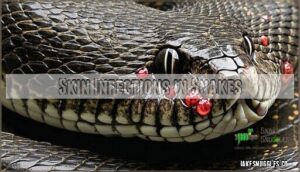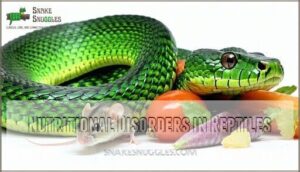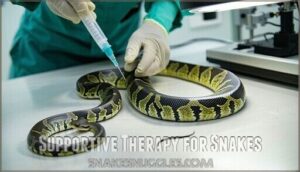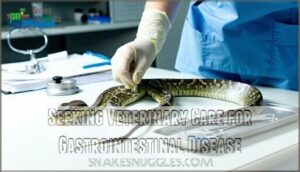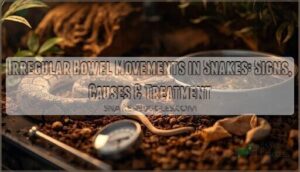This site is supported by our readers. We may earn a commission, at no cost to you, if you purchase through links.
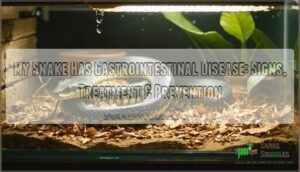
Common signs include regurgitation, loss of appetite, weight loss, and unusual bowel movements. Cryptosporidiosis is particularly troublesome—it’s highly contagious and can devastate entire collections.
Other culprits include parasites, bacterial infections, and improper husbandry. Your snake’s digestive system is like a finely tuned engine; when something goes wrong, it affects everything.
Don’t wait for symptoms to worsen—early intervention makes all the difference. The good news? Many gastrointestinal issues are preventable with proper care, and some surprising factors might be sabotaging your snake’s health.
Table Of Contents
- Key Takeaways
- Gastrointestinal Disease in Snakes
- Common Gastrointestinal Issues in Snakes
- Viral Diseases Affecting Snakes
- Digestive Disorders in Reptiles
- Nutritional Disorders in Reptiles
- Cryptosporidiosis in Reptiles
- Gastrointestinal Disease Treatment
- Preventing Gastrointestinal Disease in Snakes
- Gastrointestinal Disease in Specific Reptile Species
- Seeking Veterinary Care for Gastrointestinal Disease
- Frequently Asked Questions (FAQs)
- What diseases does a pet snake have?
- Are snakes prone to stomatitis?
- Do snakes have respiratory problems?
- What happens if a snake eats your stomach?
- What causes a snake to vomit after eating?
- Do snakes have anorexia?
- What is the treatment for gastrointestinal disease?
- What to do if your snake has IBD?
- What are gastrointestinal disease symptoms?
- What is a snake’s stomach disease?
- Conclusion
Key Takeaways
- Act fast when you spot symptoms – regurgitation, weight loss, loss of appetite, and foul-smelling diarrhea signal serious digestive problems that need immediate veterinary attention before they become life-threatening.
- Cryptosporidiosis is your biggest threat – this highly contagious parasite has no cure and spreads rapidly through contaminated equipment, making early detection through specialized testing crucial for your snake’s survival.
- Prevention beats treatment every time – maintain strict hygiene protocols, quarantine new snakes for 30-60 days, and provide proper temperatures and nutrition to stop most gastrointestinal diseases before they start.
- Don’t attempt home treatment – gastrointestinal diseases require professional diagnosis through fecal testing and specialized care, as many conditions look similar but need completely different treatments to save your snake‘s life.
Gastrointestinal Disease in Snakes
When your snake develops gastrointestinal disease, you’re dealing with a serious health issue that requires immediate attention and proper care.
Understanding the signs, causes, and treatment options can help you provide the best care for your reptile companion while working with your veterinarian.
What is Cryptosporidiosis?
Why would your snake develop cryptosporidiosis? Cryptosporidiosis is a parasitic snake gastrointestinal disease caused by microscopic protozoa called Cryptosporidium serpentis.
This contagious snake gut infection targets your snake’s stomach lining, creating chronic digestive problems that can last months or even years.
Here’s what makes this gastrointestinal parasite particularly troubling:
- No cure exists – unlike other infections, there’s no medication that’ll eliminate these gastrointestinal parasites completely
- Highly contagious – it spreads easily between reptiles through contaminated equipment and surfaces
- Chronic nature – infected snakes often struggle with ongoing digestive issues rather than acute illness
- Diagnostic challenges – Crypto Diagnosis requires specialized testing since symptoms can mimic other conditions
The parasites are incredibly resilient, surviving most disinfectants and persisting in environments for extended periods.
This makes Crypto Prevention essential if you keep multiple reptiles. Transmission can occur through direct faecal contamination, making proper hygiene essential.
While Crypto Management focuses on supportive care, understanding Crypto Transmission helps you protect your other pets from this persistent infection.
Signs and Symptoms of Crypto
Cryptosporidiosis symptoms aren’t always obvious since many snakes can be asymptomatic carriers.
Watch for regurgitation signs like undigested food, diarrhea with foul odor, weight loss, and loss of appetite.
Breathing difficulties may occur in severe cases. These snake disease symptoms develop gradually, making early detection tricky for snake gastrointestinal disease.
How Does Cryptosporidiosis Spread?
Understanding how this parasite spreads helps you protect your scaly friend from infection.
Cryptosporidiosis transmission happens through several key pathways:
- Fecal-oral route – Your snake ingests contaminated feces from infected reptiles
- Contaminated sources – Water bowls, food dishes, and equipment spread oocysts between animals
- Reptile contact – Direct contact with infected snakes facilitates transmission
- Asymptomatic carriers – Healthy-looking snakes can still shed infectious oocysts
Environmental contamination creates ongoing risks since oocysts survive for months.
Snakes can also become infected by ingesting rodents carrying Cryptosporidium parvum.
Diagnosing Cryptosporidiosis in Snakes
Getting a firm diagnosis requires detective work. Your vet will combine fecal smears, PCR testing, and physical exams to catch this sneaky protozoa.
Fecal testing spots gastrointestinal parasites, while diagnostic accuracy improves with multiple samples since asymptomatic carriers exist.
Don’t forget—shedding frequency changes can signal snake parasite infection before other cryptosporidiosis symptoms appear.
Common Gastrointestinal Issues in Snakes
While most snake owners focus on feeding schedules and housing, gastrointestinal problems can sneak up on even the most dedicated reptile keeper.
From bacterial infections like mouth rot to stubborn parasites, these digestive issues require quick recognition and proper treatment to keep your scaly friend healthy, which is crucial for dedicated reptile keepers.
Infectious Stomatitis (Mouth Rot)
Your snake might develop infectious stomatitis (mouth rot) when bacteria take hold in its mouth.
This snake bacterial infection shows up as hemorrhaging gums, thick mucus, and that unmistakable sour smell that’ll make you wrinkle your nose.
Stomatitis symptoms worsen quickly, so don’t wait around.
Treating stomatitis requires swift action:
- Injectable antibiotics target the bacteria causing the infection
- Remove pus and mucus buildup with gentle cleaning
- Rinse the mouth with antibiotic solutions as directed
Preventing stomatitis beats dealing with advanced stomatitis later.
Keep enclosures clean and maintain proper humidity levels to stop mouth rot causes before they start.
Parasites in Snakes
Your snake’s digestive system faces threats from gastrointestinal parasites like roundworms, tapeworms, and protozoa through fecal-oral transmission.
External parasites including mites also cause problems.
Many parasitic infections remain asymptomatic initially, making regular deworming schedules essential.
Helminths and other parasites require antiparasitic medications for effective treatment.
Proper hygiene prevents these unwelcome hitchhikers from settling in.
Skin Infections in Snakes
When shedding goes wrong, your snake’s skin becomes a breeding ground for trouble. Skin infections develop when retained shed skin traps bacteria, creating painful dermatitis that can escalate to life-threatening septicemia if left untreated.
Watch for these warning signs of skin infections:
- Red, inflamed skin with fluid-filled blisters from poor hygiene
- Retained spectacles covering eyes, risking permanent blindness
- Shedding problems from low humidity or rough surfaces
- Blister treatment needs immediate veterinary attention for recovery
Respiratory Disease in Snakes
When your snake starts wheezing or showing excess mucus, bacterial pneumonia might be the culprit.
Respiratory disease in snakes often stems from environmental factors like poor ventilation or high humidity.
Treatment options include antibiotics and supportive care, while severe cases may require fluid therapy.
Watch for lethargy alongside breathing issues, as viral pneumonia and fungal infections can also affect your pet’s respiratory system.
Viral Diseases Affecting Snakes
When your snake develops gastrointestinal disease, viral infections like Inclusion Body Disease (IBD), nidovirus, and paramyxovirus can be serious culprits that require immediate attention.
These viral diseases don’t respond to antibiotics and often cause severe digestive symptoms that can quickly become life-threatening if left untreated, highlighting the importance of viral infections in such cases.
Inclusion Body Disease (IBD)
Unfortunately, Inclusion Body Disease (IBD) represents one of the most devastating viral illnesses your snake can face. This fatal condition attacks the nervous system and digestive tract, leaving no treatment options available. IBD symptoms include regurgitation, neurological problems, loss of appetite, and progressive weakness that signals the disease’s relentless progression.
IBD strikes fast and leaves no survivors – early detection is your only weapon against this silent killer.
The harsh reality of IBD creates four critical challenges for snake owners:
- IBD transmission occurs rapidly through direct contact and contaminated environments
- IBD diagnosis requires specialized testing that many veterinarians can’t perform immediately
- IBD management focuses solely on comfort care since no cure exists
- IBD research continues but hasn’t yielded breakthrough treatments yet
When you suspect snake illness involving these neurological problems, immediate quarantine prevents spread to other reptiles. Your veterinarian will discuss supportive care options and difficult decisions about your snake’s quality of life. Understanding inclusion body disease helps you recognize symptoms early and protect your entire collection from this heartbreaking snake health crisis.
Nidovirus and Paramyxovirus in Snakes
Beyond IBD, two other viral threats pose significant risks to your snake’s health.
Nidovirus causes severe respiratory disease, particularly in pythons, with infection rates reaching 75.8% in green tree pythons.
Paramyxovirus affects multiple species, causing respiratory symptoms and neurological impact including head tremors.
Both viruses spread through respiratory secretions and contaminated surfaces, leading to gastrointestinal effects and lethargy.
Prevention strategies include strict quarantine protocols, regular testing, and maintaining proper hygiene in enclosures to prevent viral transmission, which can be achieved through regular testing.
Signs and Symptoms of Viral Diseases
Recognizing viral disease symptoms in your snake can feel overwhelming, but knowing what to watch for helps you act quickly.
These viruses affect snakes differently than other pathogens, creating distinct warning signs you shouldn’t ignore.
- Neurological Signs: Watch for tremors, seizures, or unusual head movements that suggest brain involvement
- Respiratory Issues: Listen for wheezing sounds and check for excessive mucus around the mouth
- Lethargy: Your snake becomes unusually inactive and withdraws from normal behaviors
- Appetite Loss: Complete refusal to eat signals serious disease progression requiring immediate attention.
Regular monitoring can aid in detecting early signs of illness.
Treatment and Prevention of Viral Diseases
When viruses strike your snake, you’ll need to focus on supportive care since antiviral medications remain limited.
Quarantine protocols become your first line of defense—isolate new arrivals for at least 30 days before introducing them to your collection.
| Prevention Strategy | Implementation | Effectiveness |
|---|---|---|
| Quarantine protocols | 30-day isolation | High |
| Biosecurity measures | Disinfect equipment | Moderate |
| Hygiene practices | Hand washing | High |
| Vaccination research | Currently developing | Future potential |
| Supportive care | Fluid therapy | Moderate |
Treatment focuses on managing symptoms through proper hydration and nutrition.
Prevention through strict hygiene practices and quarantine remains your best weapon against viral outbreaks.
Digestive Disorders in Reptiles
If your snake’s been refusing food, vomiting, or having diarrhea, digestive disorders could be the culprit.
These issues often stem from stress, poor diet, parasites, or environmental problems that disrupt your snake’s normal gut function.
Causes of Digestive Disorders
Understanding what triggers snake digestive issues helps you protect your pet’s health.
Stress factors like improper temperatures, overcrowding, or frequent handling can disrupt normal digestion.
Poor diet choices, including wrong prey sizes or spoiled food, create serious digestive disorders.
Parasitic infections from bacteria, protozoa, or worms attack the gastrointestinal system directly.
Environmental issues such as dirty habitats or incorrect humidity levels weaken your snake’s immune system.
Foreign bodies like substrate ingestion cause dangerous blockages.
Reptile GI problems often stem from these preventable causes.
Preventing digestive disorders starts with recognizing these triggers.
The importance of proper nutrition can’t be overstated – it’s your first line of defense against snake digestive issues.
Signs and Symptoms of Digestive Disorders
Snake digestive issues often manifest through regurgitation issues, where your pet brings up undigested food.
Watch for anorexia signs like refusing meals, plus abnormal stools that smell foul or contain blood. Weight loss and abdominal swelling signal serious problems requiring immediate veterinary attention.
- Snake vomiting – Undigested food appearing hours after feeding
- Snake diarrhea – Watery, foul-smelling feces with unusual color
- Snake loss appetite – Refusing food for extended periods beyond normal fasting
- Fecal odor – Strong, unpleasant smell indicating bacterial infection or parasites
Treatment Options for Digestive Disorders
When your snake shows digestive problems, your vet will create a treatment plan customized to the specific issue.
Fluid therapy helps combat dehydration, while antibiotic use targets bacterial infections.
Probiotics restore healthy gut bacteria, and dietary adjustments support recovery.
Severe cases may require surgical options for obstructions or foreign bodies.
Preventing Digestive Disorders in Reptiles
Prevention beats treatment every time in the context of keeping your reptile healthy. Start with proper hygiene practices by cleaning enclosures weekly and washing hands before handling.
Create a healthy diet and environment with appropriate temperature gradients and water quality. Source prey from reputable suppliers and use proper substrates that won’t cause impaction.
Focus on stress reduction through consistent routines and quarantine new animals.
- Your snake’s digestive health depends on the care you provide today
- Clean environments prevent 80% of gastrointestinal infections before they start
- Proper preventing gastrointestinal disease measures save costly veterinary bills later
Nutritional Disorders in Reptiles
Your snake’s nutritional health directly impacts its digestive system, and poor nutrition can trigger serious gastrointestinal problems that’ll leave you worried sick.
When snakes don’t get the right balance of nutrients, prey size, or feeding schedule, they’re more likely to develop everything from regurgitation to metabolic bone disease.
Importance of Proper Nutrition
Your snake’s nutritional foundation directly impacts its digestive health.
A balanced diet with proper prey type variety prevents many nutritional disorders.
Consider these key factors:
Nutritional Considerations Why They Matter
Feeding frequency
Supplementation
Quality snake nutrition means offering appropriately-sized whole prey items.
Hydration needs matter too—dehydrated snakes face increased digestive problems.
Good snake digestive care starts with consistent, species-appropriate feeding schedules.
Signs and Symptoms of Nutritional Disorders
Your reptile might be telling you something important through these warning signs.
Poor appetite and lethargy often signal nutritional problems that need immediate attention.
Watch for these key indicators of nutritional disorders:
- Shell deformities – Soft or misshapen shells in turtles from calcium deficiency
- Abnormal growth – Stunted development or unusual bone formation patterns
- Muscle weakness – Difficulty moving or maintaining normal posture
- Loss of appetite – Refusing food consistently over several feeding cycles.
These symptoms can quickly spiral into serious snake health issues if ignored.
Treatment Options for Nutritional Disorders
Once you’ve identified nutritional disorders in your snake, quick action makes all the difference. Dietary Adjustments form the foundation of treatment, whether you’re boosting calcium levels or adding vitamin supplements to combat deficiencies.
Calcium Therapy and UVB Lighting work together to address metabolic bone disease, while Supplementation Strategies target specific vitamin gaps. A balanced diet requires essential nutrients for growth.
Supportive therapy options include:
- Fluid therapy for dehydration issues
- Probiotics to restore gut health
- Surgical Interventions for severe complications
Preventing Nutritional Disorders in Reptiles
You’ll protect your reptile’s health by offering balanced diets with proper supplementation needs and proper hydration.
Research species-specific reptile nutrition requirements, including feeding frequency and prey size.
Environmental enrichment and regular monitoring help prevent nutritional disorders.
Making smart dietary changes now means avoiding costly health issues later—your snake’s digestive system will thank you!
Cryptosporidiosis in Reptiles
If you’re concerned about your snake’s digestive health, cryptosporidiosis is a serious parasitic infection that you’ll want to understand.
This protozoan disease affects up to 50% of snakes with gastrointestinal symptoms and spreads easily through contaminated environments, making early detection essential for your pet’s wellbeing.
Prevalence of Cryptosporidiosis
Cryptosporidiosis affects 10-50% of captive snake populations, with certain species showing higher susceptibility than others.
This contagious protozoa spreads rapidly through reptile collections, making understanding crypto occurrence vital for prevention.
- Corn snakes face elevated risk factors compared to other species
- Geographic distribution shows higher prevalence in tropical regions
- Captive snakes experience greater exposure than wild populations
The gastrointestinal disease‘s prevalence varies substantially by environment and management practices, with captive snakes being more susceptible.
Diagnostic Challenges
Why can’t you spot crypto infections easily? Fecal analysis often gives false negatives since these microscopic parasites hide in small numbers.
Stool samples may miss infections entirely, while X-rays can’t detect crypto specifically. Asymptomatic infections complicate differential diagnosis further.
Diagnostic challenges persist because standard tests lack sensitivity for reptile gastrointestinal health issues, requiring novel techniques beyond traditional imaging limitations.
Gastric lavage and endoscopy can provide direct examination results.
New DNA Test for Accurate Diagnosis
Modern DNA tests revolutionize reptile gastrointestinal health by detecting cryptosporidiosis with remarkable test accuracy.
These advanced genetic markers enable early detection that traditional methods often miss, transforming diagnosis for your snake’s wellbeing.
- Test Accuracy: PCR testing achieves 94.4% sensitivity versus microscopy’s 61.1%
- Early Detection: Identifies low parasite burdens before symptoms appear
- Genetic Markers: Distinguishes snake-specific Cryptosporidium from prey-derived parasites
- Cost Analysis: Prevents expensive treatment by catching gastrointestinal disease early
Managing Cryptosporidiosis in Reptiles
Once you’ve identified cryptosporidiosis through testing, you’ll need to shift your focus to thorough management strategies.
Since there’s no cure available, your approach centers on Supportive Care and strict Hygiene Protocols.
Quarantine Measures become your first line of defense against the fecal-oral route transmission.
Environmental Control and Nutritional Support help your reptile maintain strength while battling this challenging gastrointestinal disease.
| Management Strategy | Implementation | Expected Outcome |
|---|---|---|
| Supportive Care | Fluid therapy, temperature regulation | Symptom relief, comfort |
| Hygiene Protocols | Daily cleaning, disinfection | Reduced contamination risk |
| Quarantine Measures | Separate housing, limited contact | Prevention of spread |
| Environmental Control | Ideal humidity, temperature | Stress reduction |
| Nutritional Support | Easily digestible foods | Maintained body condition |
Managing cryptosporidiosis in reptiles requires patience and dedication, but proper care can substantially improve your pet’s quality of life.
Gastrointestinal Disease Treatment
When your snake develops gastrointestinal disease, prompt treatment becomes essential for recovery and preventing serious complications.
You’ll need to work with your veterinarian to create a thorough treatment plan that addresses the underlying cause while supporting your snake’s overall health.
Supportive Therapy for Snakes
When your snake faces gastrointestinal disease, supportive therapy becomes your lifeline.
This thorough approach focuses on keeping your pet comfortable while their body fights the illness.
Here’s your essential supportive care checklist:
- Fluid Therapy – Maintain proper hydration through subcutaneous or intravenous fluids
- Temperature Regulation – Keep enclosure temperatures ideal for immune function and digestion
- Nutritional Support – Provide easily digestible foods or assist-feeding when necessary
- Pain Management – Use appropriate analgesics to reduce discomfort and stress
- Wound Care – Clean and protect any external lesions from secondary infections
Medication Options for Gastrointestinal Disease
Several medication options can help your snake recover from gastrointestinal disease.
Your reptile vet will choose treatments based on the specific condition and severity of symptoms.
- Antibiotic therapy with ceftazidime or enrofloxacin targets bacterial infections
- Antiparasitic medications like metronidazole eliminate protozoal parasites and worms
- Antifungal drugs such as itraconazole treat systemic fungal infections
- Anti-inflammatory drugs reduce gut inflammation and improve comfort
- Probiotics restore healthy gut bacteria after medication treatment
Dietary Changes for Snakes With Gastrointestinal Disease
When your snake battles gastrointestinal disease, smart dietary changes become your best ally.
Offer smaller prey size to ease digestion, and reduce feeding frequency to let their gut heal.
Monitor hydration closely—dehydrated snakes can’t recover properly.
Consider probiotics and digestive supplementation to restore gut health.
These targeted adjustments to your snake diet help manage digestive disorders and nutritional disorders effectively.
Environmental Changes for Snakes With Gastrointestinal Disease
Beyond basic care, strategic environmental changes can substantially improve your snake’s recovery from gastrointestinal disease.
Creating the right conditions supports healing and prevents complications.
- Temperature Gradient: Maintain proper basking and cool zones (80-95°F) to optimize digestion
- Humidity Levels: Keep 50-60% humidity to prevent dehydration and aid nutrient absorption
- Substrate Choice: Use paper towels or reptile carpet for easy cleaning and monitoring. Consider reptile carpet options for easy maintenance.
- Enclosure Size: Provide adequate space to reduce stress-related digestive issues
- Hiding Spots: Add secure retreats on both warm and cool sides for comfort
Preventing Gastrointestinal Disease in Snakes
You can prevent most gastrointestinal problems in your snake by maintaining proper hygiene, quarantining new reptiles, and providing the right environment.
Regular vet checkups and a species-appropriate diet will catch issues early and keep your snake’s digestive system healthy.
Proper Hygiene Practices
Treatment goes hand in hand with prevention, and proper hygiene practices form your first line of defense against gastrointestinal disease in snakes. You’re basically creating a fortress of cleanliness that keeps harmful bacteria, viruses, and parasites at bay.
Enclosure Cleaning should happen weekly with complete substrate changes and thorough disinfecting surfaces using reptile-safe cleaners. To guarantee a safe environment, consider using a reptile-specific disinfectant. Water Sanitation means changing water bowls every few days and scrubbing them clean—stagnant water becomes a breeding ground for trouble. Hand Washing before and after handling prevents cross-contamination between you and your snake. Waste Disposal requires immediate removal of feces and uneaten food to prevent bacterial growth.
Think of environmental hygiene as your snake’s health insurance policy. Here’s what proper snake enclosure hygiene protects against:
- Cryptosporidiosis spreading through contaminated feces
- Bacterial infections from dirty water bowls
- Parasitic eggs hatching in soiled substrate
- Respiratory issues from poor air quality
- Septicemia from accumulated waste toxins
Consistent hygiene practices aren’t just about cleanliness—they’re about giving your snake the best shot at a healthy, disease-free life. Your reptile health depends on these daily habits.
Quarantine and Isolation Procedures
When establishing quarantine protocols, think of it as your snake’s safety net—quarantine new reptiles for 30-60 days before introducing them to your collection.
This isolation period prevents transmission of gastrointestinal diseases while you monitor for symptoms.
| Quarantine Step | Requirements |
|---|---|
| Duration | 30-60 days minimum |
| Setup | Separate enclosure with proper heat/humidity |
| Equipment | Dedicated tools to prevent cross-contamination |
| Monitoring | Daily health checks for symptoms |
| Hygiene protocols | Wash hands between handling different snakes |
Regular Veterinary Check-Ups
Regular veterinary checkups serve as your snake’s health safety net, catching gastrointestinal disease before it becomes serious.
Early detection through preventative care can save your pet’s life and your wallet from expensive treatments.
- Schedule annual exams for adult snakes, with parasite screening and thorough health monitoring
- Bring fresh fecal samples for testing during visits to detect hidden parasites
- Ask for expert advice on proper husbandry, feeding schedules, and environmental needs specific to your species
Your vet becomes your partner in maintaining ideal snake health through consistent reptile care, providing expert advice.
Healthy Diet and Environment
Your snake’s health depends on balanced nutrition, proper heating, and a clean enclosure.
Feed appropriate prey sizes, maintain temperature gradients, and guarantee adequate hydration methods.
Accurate readings from a reptile’s thermometer are vital for maintaining correct temperatures.
Remove waste promptly and provide hiding spots for stress reduction.
These fundamentals prevent most digestive disorders and keep your snake thriving through proper diet, treatment, and prevention strategies.
Gastrointestinal Disease in Specific Reptile Species
Different snake species face unique gastrointestinal challenges, and understanding these species-specific issues helps you provide better care for your pet.
Ball pythons commonly struggle with feeding refusal and regurgitation, while corn snakes are particularly susceptible to cryptosporidiosis infections that can spread quickly through collections.
Cryptosporidiosis in Corn Snakes
Your corn snake faces a genetic predisposition to cryptosporidiosis, with Cryptosporidium serpentis affecting up to 24% of captive populations.
This protozoan parasite causes chronic gastritis, leading to regurgitation and midbody swelling. Understanding crypto transmission helps protect your pet.
Managing cryptosporidiosis requires vigilance:
- Crypto prevention through strict quarantine protocols for new animals
- Corn snake immunity support with proper nutrition and stress reduction
- Regular PCR testing to detect subclinical infections early
- Steam sterilization of enclosures to eliminate resistant oocysts
- Breeding implications screening to prevent transmission to offspring
Gastrointestinal Disease in Leopard Geckos
Gastrointestinal disease strikes leopard geckos hard, with Cryptosporidium varanii causing severe weight loss and "stick tail" syndrome.
You’ll notice digestive disorders through diarrhea, lethargy, and anorexia.
Dietary impaction from improper substrates worsens symptoms.
Quarantine setup prevents spread of common pathogens.
Preventative care includes probiotics benefits and proper husbandry for ideal snake health across all reptiles.
Digestive Disorders in Ball Pythons
Unlike leopard geckos, ball pythons face different digestive challenges that you’ll need to watch for.
Stress, improper husbandry, and parasites like Cryptosporidium can trigger anorexia, regurgitation, and midbody swelling in your snake. Temperature impact on feeding frequency matters more than you’d think – cold environments shut down their appetite completely.
Your snake vet can help identify prolapse issues and reptile intestinal blockage before they become serious problems.
Here are 4 key signs to monitor:
- Regurgitation Causes: Stress, incorrect temperatures, or handling too soon after feeding
- Feeding Frequency: Ball pythons may refuse food for months without harm
- Prey Size: Oversized meals can cause digestive disorders and blockages
- Temperature Impact: Cold conditions prevent proper digestion and feeding response
Gastrointestinal Disease in Other Reptile Species
While ball pythons face unique challenges, other reptiles battle similar gastrointestinal disease issues.
Turtle GI problems affect chelonians worldwide, with digestive disorders striking lizards, crocodilians, and various species differently.
Reptile dysbiosis disrupts gut bacteria, causing symptoms ranging from mild discomfort to severe illness.
Proper diagnosis remains challenging across species.
| Species | Common GI Issues | Diagnostic Methods |
|---|---|---|
| Turtles | Hypovitaminosis A, parasites | Fecal examination, blood work |
| Lizards | Cryptosporidiosis, impaction | PCR testing, radiographs |
| Crocodilians | Bacterial infections, foreign bodies | Endoscopy, culture testing |
| Iguanas | Dysbiosis, metabolic disorders | Thorough health screening |
| Geckos | Stick tail syndrome, coccidia | Microscopic analysis, imaging |
Seeking Veterinary Care for Gastrointestinal Disease
When your snake shows signs of gastrointestinal disease, you’ll need professional veterinary care to get an accurate diagnosis and proper treatment plan.
Don’t wait too long—early intervention can make the difference between a manageable condition and a serious health crisis.
When to Consult a Veterinarian
Three warning signs demand immediate veterinary attention: severe symptoms like persistent regurgitation, anorexia duration exceeding two weeks, and obvious distress in your snake.
Knowing when to seek help is vital, especially if you observe labored or wheezing breathing.
Don’t play the waiting game when gastrointestinal disease strikes. Preventative care visits help catch issues early, while prompt consultation prevents uncertain diagnosis from becoming serious complications.
Your snake’s health depends on swift action.
What to Expect During a Veterinary Visit
Now you’re at the vet’s office—time for the real detective work to begin! Your veterinarian will conduct a thorough physical examination, checking your snake’s body condition, mouth, and skin for signs of illness.
They’ll likely request stool samples and may recommend X-rays or other diagnostic tests to pinpoint the problem. Don’t worry if this feels overwhelming; your vet will walk you through everything.
- Bring recent photos of symptoms and any regurgitated material for exam preparation
- Expect diagnostic tests like fecal analysis, blood work, or imaging studies
- Discuss all available treatment options, including medications and supportive care protocols
- Ask about home care instructions, prognosis discussion, and follow-up scheduling requirements
Importance of Follow-Up Care
Following your first vet visit, long-term monitoring becomes vital for your snake’s recovery.
Medication adherence prevents relapse prevention – skipping doses opens doors for gastrointestinal disease comeback.
Your vet will schedule follow-ups to assess treatment progress and make dietary adjustments or environmental control changes.
Consistent management through regular check-ins guarantees your snake stays healthy long-term.
Frequently Asked Questions (FAQs)
What diseases does a pet snake have?
Something’s wrong, and you need answers fast. Your snake might’ve parasitic infections like cryptosporidiosis, bacterial diseases such as mouth rot, viral conditions like IBD, or digestive disorders from poor diet.
Are snakes prone to stomatitis?
Yes, snakes are quite prone to stomatitis, also known as mouth rot.
This bacterial infection affects their gums and mouth tissues, causing hemorrhaging, excess mucus, and a distinctive sour smell that’s hard to miss.
Do snakes have respiratory problems?
About 60% of bacterial infections in captive snakes cause respiratory disease, making breathing troubles surprisingly common.
You’ll notice wheezing, excess mucus, and lethargy when your snake’s respiratory system gets compromised by bacteria, viruses, or environmental issues.
What happens if a snake eats your stomach?
Snakes can’t actually eat your stomach – they’re physically incapable of consuming humans from the inside out.
If you’re worried about your snake’s digestive health, watch for regurgitation, weight loss, or abnormal stools instead, focusing on clear signs like regurgitation.
What causes a snake to vomit after eating?
Your snake might vomit after eating due to improper temperatures, handling too soon post-feeding, oversized prey, stress, infections, or parasites. Environmental factors and digestive disorders commonly trigger regurgitation in snakes.
Do snakes have anorexia?
Like a telegraph operator sending urgent news, anorexia absolutely affects snakes.
When you’re dealing with gastrointestinal disease, loss of appetite hits about 80% of affected snakes.
It’s their body’s way of saying "something’s wrong here, folks, with a significant impact on their health.
What is the treatment for gastrointestinal disease?
Treatment involves identifying the underlying cause through fecal tests and diagnostic imaging.
You’ll need targeted antiparasitic medications, antibiotics, or supportive care depending on whether it’s parasitic, bacterial, or nutritional.
Environmental improvements and proper feeding protocols are essential for recovery.
What to do if your snake has IBD?
Unfortunately, there’s no cure for IBD – it’s a death sentence that’ll break your heart.
You can’t save your snake, but you can ease their suffering with supportive care, pain management, and euthanasia when quality of life deteriorates.
What are gastrointestinal disease symptoms?
You’ll notice regurgitation, weight loss, and loss of appetite as the main red flags.
Diarrhea with foul odors, undigested food in stool, and lethargy often follow, signaling your pet needs immediate veterinary attention.
What is a snake’s stomach disease?
Your snake’s digestive system resembles a delicate assembly line—when one part breaks down, everything backs up.
Snake stomach disease typically involves bacterial infections, parasites, or obstructions causing regurgitation, weight loss, and abnormal stools requiring veterinary diagnosis.
Conclusion
Like a ticking time bomb, gastrointestinal disease can silently destroy your snake’s health before you notice.
If you suspect "my snake has gastrointestinal disease," don’t hesitate—immediate veterinary care is essential.
Early diagnosis and treatment substantially improve outcomes.
Remember, prevention beats treatment every time.
Maintain proper hygiene, quarantine new animals, and provide appropriate nutrition.
Your snake’s digestive health depends on consistent care and quick action when problems arise.
- https://www.vcahospitals.com/know-your-pet/common-diseases-of-pet-snakes
- https://www.petmd.com/reptile/conditions/digestive/c_rp_cryptosporidiosis
- https://bioone.org/journals/Journal-of-Herpetological-Medicine-and-Surgery/volume-29/issue-3-4/19-05-201.1/Gastric-Cryptosporidiosis-in-Snakes-a-Review/10.5818/19-05-201.1.full
- https://vcahospitals.com/know-your-pet/snakes-diseases
- https://www.petcoach.co/article/egg-binding-dystocia-in-reptiles-causes-signs-diagnosis-tre/

